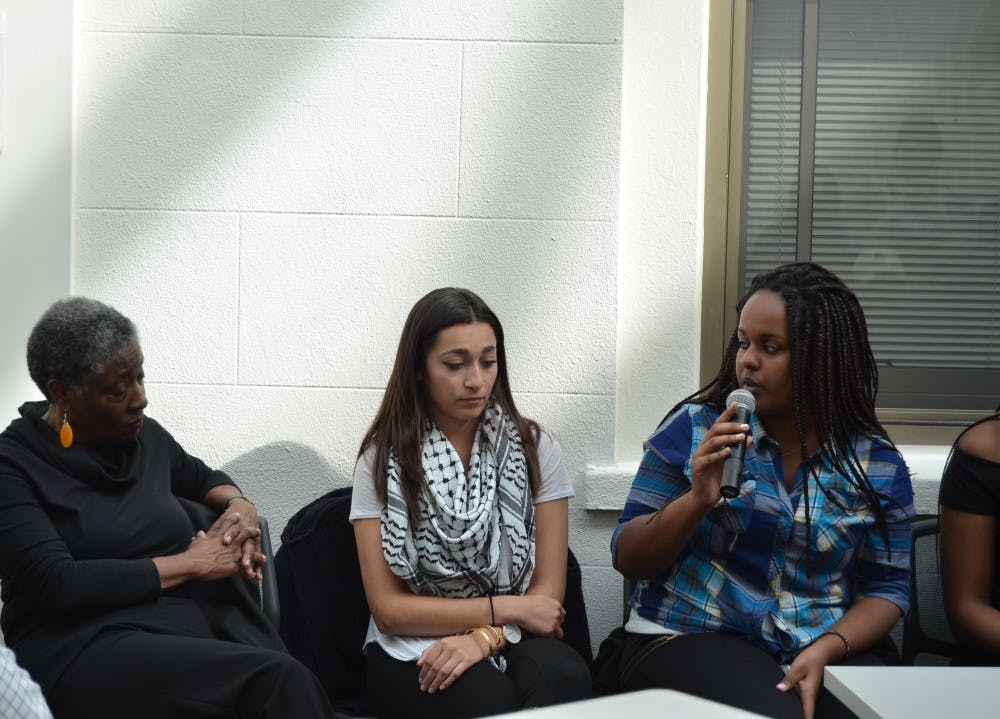With a crowd that overflowed out of the Battelle atrium, the College of Arts and Sciences celebrated the launch of the Critical Race, Gender, and Culture Studies Collaborative (GRGC) on April 6 with “Black Lives Matter: A Conversation.” The new initiative strives to become “the hub of socially engaged scholarship at AU,” according to Associate Professor of History and collaborative chair Theresa Runstedtler.
The collaborative houses six interdisciplinary programs, including American Studies, Arab World Studies, Asian Studies, Multi-Ethnic Studies and Women’s, Gender and Sexuality Studies as well as African American and African Diaspora Studies, a minor program that students and faculty are working to make a major, Runstedtler said.
A panel of student activists, moderated by Associate Professor of Literature Keith Leonard, kicked off the event by discussing the current state of affairs for students of color at AU and barriers they have faced with administrators, faculty and other students. Nick Pierce, a junior in the College of Arts and Sciences involved with the Black Student Alliance, added that it is imperative to acknowledge the importance of mental health services for students of color.
“I think the problem is that administration is in a way, I don’t want to say profiting, but they’re benefiting from bringing these minority students to campus, bringing these bodies on campus, but when they come here, they have no support,” Pierce said. “There needs to be support financially...[and] in terms of getting spaces for counseling and mental health and making sure that students know about them.”
AU alumna Marita Golden, an award-winning author and a co-founder of an organization that supports black writers, joined the conversation to offer advice for the student leaders, which included Pierce, Tatiana Laing, Sydney Young, Maysa Amer and Helen Abraha.
“I want you to love yourselves, not just your people,” Golden told the panelists. “You will be of no use to your people if you’re gone, so you need to start, sometimes, chilling. You can’t be Ida B. Wells 24/7. You need to kick back, have a potluck...take white folk off the agenda, and love yourselves."
No filter, just #BlackGirlMagic with @2LiveUnchained . Thank you x100 for amplifying the voices of black students pic.twitter.com/DhH2BfCjAM
— Tatiana Laing (@ItCouldntBeDone) April 6, 2016
The event continued with remarks from Erika Totten, a Black Lives Matter activist who runs “emotional emancipation circles” for people of African descent in D.C. She broke down in tears as she recounted her experiences working with students of color who came in “hurting and crying” about the trauma they experienced at AU.
“That trauma shows up in our backs, our knees, and in our relationships with other people,” Totten told the audience. “Black people are resilient...there is a lot we have been holding onto.”
After mentioning President Neil Kerwin’s op-ed in the Eagle last fall, Totten spoke out against the concept of inclusion, telling the crowd to take the term out of their vocabulary and replace it with “collaboration.”
“Inclusion is a white supremacist tactic that really means assimilation,” Totten said. “What exactly are you attempting to include people in? A system that has proven to be traumatic and violent? A system that labels them as other? It’s not the way to go.”
Marcia Chatelain, an associate professor of history at Georgetown University, gave a historical perspective by contrasting how the Civil Rights Movement and Black Lives Matter have been portrayed by historians and the media. A graduate of the University of Missouri, Chatelain frequently referenced the student protests that took place on the Columbia campus in November.
“No one ever questions this as movement activity,” Chatelain said, referring to a slide depicting Martin Luther King, Jr. speaking at the March on Washington in 1963. “But when I ask them about the University of Missouri, they hesitate to understand why #ConcernedStudent1950 was part of a movement, what it meant to have an issue like Ferguson on a campus like Missouri evolve into this moment.”
"#BlackLivesMatter is not a hostile statement but a question that a generation has to answer." -@DrMChatelain
— Bryna Kramer (@brynak13) April 6, 2016
Chatelain said she admires Black Lives Matter for “their creativity and expansive vision of freedom.” She encouraged the audience to consult newspapers and history books to understand movements and actively respond to their demands -- actions that Mizzou administrators should have taken, Chatelain said.
“Use history as a tool of activism and as a tool of self-reflection,” Chatelain said. “It is a road map to the perils that may lay in front of you.”





